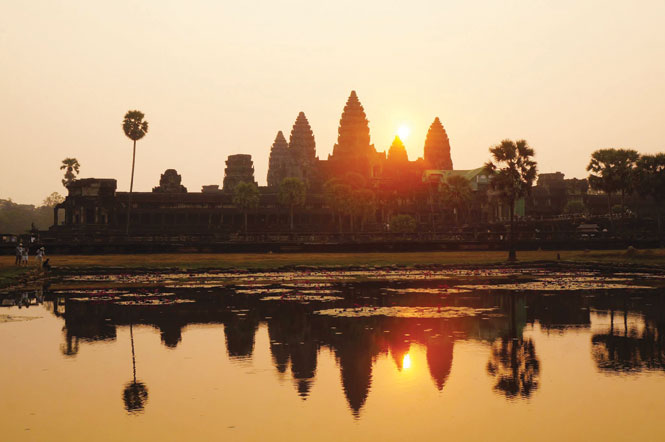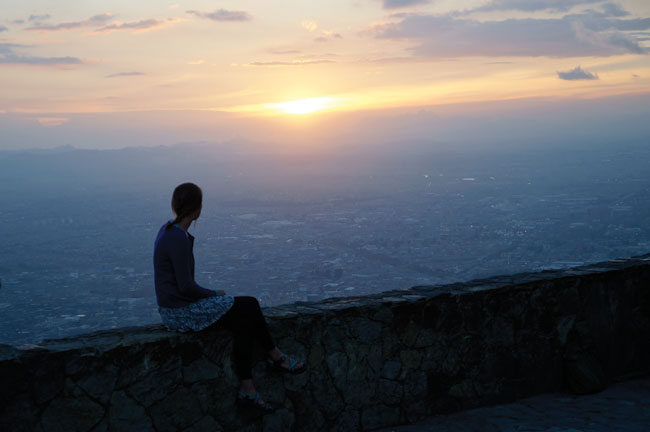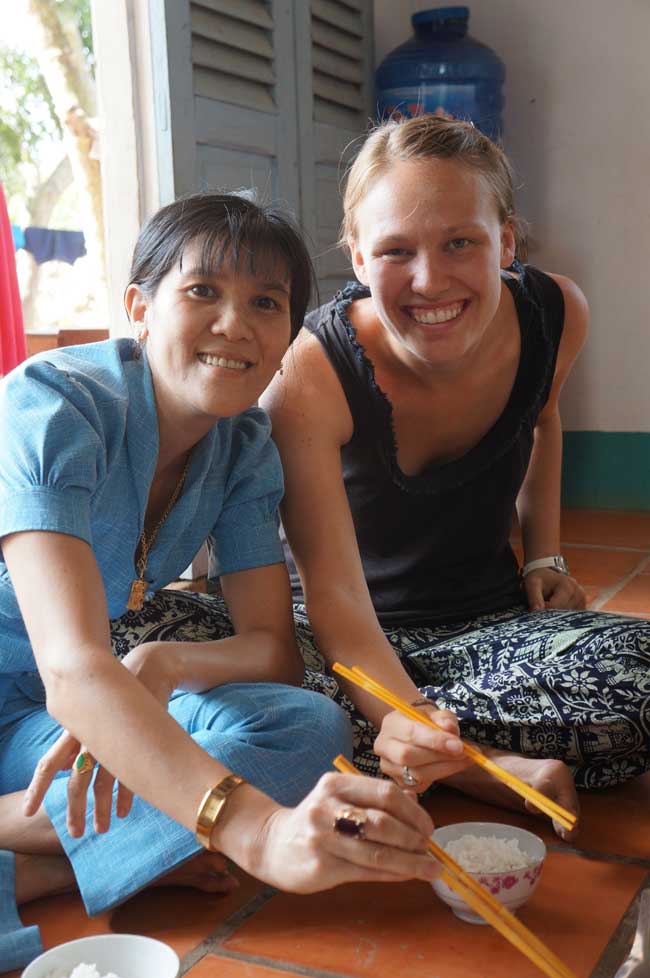Kathleen Russell spent the last year traveling the world through the Michael B. Keegan Fellowship. The goal of the fellowship is to develop future leaders through world travel and experiential learning. Fellows have the opportunity to pursue an idea or an issue about which they are impassioned in the context of daily life in communities around the world. Russell graduated in May 2012 with degrees in human and organizational development and earth and environmental sciences with a concentration in public policy.

To travel is to learn.
Over the past year, there were times that I would close my eyes and wish that I were walking across Peabody lawn, with the crisp fall air, the crunch of leaves, and the striking yet welcoming façade of the Wyatt Rotunda. But just for a moment. The fleeting allure of familiarity—of “home”—could not compete with the fruit of the unexplored. My time at Vanderbilt had ended, and I was on a new adventure: the Michael B. Keegan Traveling Fellowship.
In August 2012, I began my journey as a Keegan Fellow with the goal of studying the role of transportation around the world, particularly through a lens of quality of life and equity of access.
I had not realized transportation’s holistic effects—on physical and mental health, social equity, public access, energy security, public space, quality of life, accommodation of rising urban populations—until I studied abroad as a junior in Copenhagen, a city renowned for cycling networks and integrated public transit.

That experience made me want to understand the daily challenges presented by transportation and how they could be addressed by innovation. I wanted to more fully engage in and encourage a global discussion. I knew I could do this best through personal experience.
And now—after 373 days, 24 countries, five continents, 176 sleeping surfaces, and hundreds of hours, and thousands of miles of travel—my journey has come to an end.
In some ways, this entire year seems to have happened in a blink, a dream. The world to which I returned is seemingly unchanged, my memories surreal.
I’ve had none of the familiar indicators of the passage of time, but if I measure time in my own growth and understanding, surely years have passed. This year brought me from the safe confines of undergraduate life into the frenzy and beauty of the nomadic; from a class schedule to constant improvisation; from book learning to marinating in knowledge and culture.

To travel is to learn. Incessantly. Unceasingly. Every day is new. Every day requires you to adapt; to figure out where you are, where you need to go, and how you need to get there. Travel gives you a wider lens of understanding. You realize you have come to see life in a new way, but you can’t really point to when this happened, because you are constantly growing.
And you can never turn back.
And this is great.
The world is far more than a postcard—far more frustrating and far more enchanting. There are so many things that I could not have truly understood without this immersion. I saw things with my own eyes; I tasted them on my lips; I felt them with my hands and in my heart.
I would not truly understand transportation in Cape Town until I observed the lasting influences of apartheid, particularly through my host’s stories and experiences as a prominent member of the Black Sash human rights organization. I could not absorb the disparities, until I saw the regional distribution of townships—so purposely placed outside the city and away from jobs, health care, education and other resources—could not internalize it until I experienced the wild rides of the minibus taxis, swerving in and out of traffic, racing to pick up and squeeze as many passengers as possible into outdated, probably-shouldn’t-be-on-the-road vehicles.
I would not truly understand the daily costs of breathing the polluted air or why people wear face masks in Asian megacities like Mumbai, New Dehli, Bangkok, Jakarta, Manila and Beijing until I experienced breathing this air every day during my commutes.

Until I felt it settle in my throat and lungs.
Until I saw the residue it left on my clothes.
Until I was able to stare directly at the sun due to the shielding power of smog.
I would not truly understand the significance of Medellin’s transportation innovations—particularly its use of cable cars to service the underdeveloped barrios stretching up the hills of this valley city in Colombia—until I saw the transformed neighborhoods. Until I rode them with the people who used them every day.
Until I heard the pride in their voices as they described what their city accomplished despite a past riddled with violence.
Without all these experiences, I could not have understood the people. For what is travel but the opportunity to implant yourself into another life—to leave behind everything and come to understand another way of being?

I will never forget wandering the lazy inlets of the Mekong Delta on Tet, the Vietnamese New Year, with my thoughts drifting to its bloody history, when I heard voices calling. I turned to meet them. Nothing could have been more of a contrast to my 1968 imaginings than the eager and smiling faces welcoming my companions and me into their modest home. We cooked together, ate together and celebrated the New Year. We didn’t speak Vietnamese, and they didn’t speak English. But a smile goes a long way.
I will never forget the generosity of Mustafa and Ramazan at their home in Turkey. Though Mustafa had spent a few months in the United States, Ramazan had never met an American. Over our freshly caught fish and homegrown vegetables, Mustafa translated as Ramazan questioned me about past and present U.S. foreign policy in the Middle East. I felt the weight of my words, far greater than anything I had ever written in an essay or spoken in a class debate, for they were determining a man’s perception of a nation. I realized that I had become an ambassador by default.
I will never forget the strong, protective hand grabbing my arm, rescuing me from a sea of piranha taxi drivers pulling in every direction, eager to take advantage of an out-of-place mzungu in the middle of the night in Tanzania.
The Malawian woman whisked me away to safety, cursing the taxis and scolding the bus driver. In that moment, at the end of a cross-continent overland journey full of mishaps, I saw the truth of my travels: I would only succeed so long as the world carried me.
Despite traveling solo, I was by no means alone. Strangers became friends. They taught me, and I taught them. I was fully immersed in the transcendental power of relationship, the ability to connect beyond culture, beyond language, and beyond preconceptions.

That, I learned, is the point of everything: To touch the world and to embrace humanity: fully, resolutely, without reservation.
In these first days of returning from my travels, I am
still—and will be for some time—sorting through my experiences and emotions. Even in this raw state of reflection, I am profoundly aware of a transformation, one that has burned through me with both the staccato bursts of fireworks and the soft, steady glow of an oil lamp.
While the details and ultimate ramifications are still blurred, this year has undeniably altered, shaped and fortified my future.
In the midst of rumination, what I can say for sure is this:
the world is beautiful;
people are astounding;
my soul is enriched.
And that’s more than enough for now.
See Kathleen’s extensive photo galleries on her Facebook page.